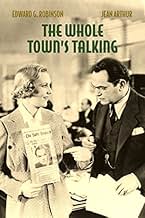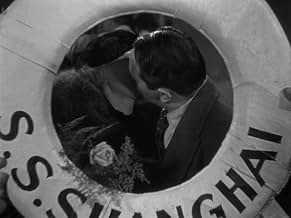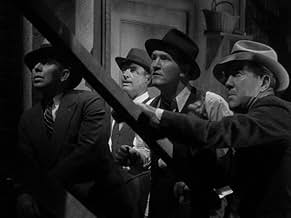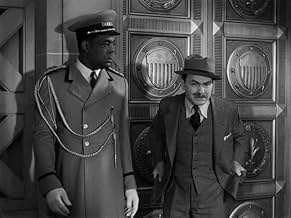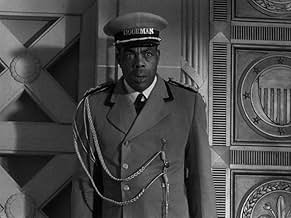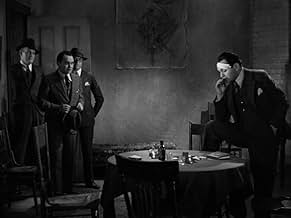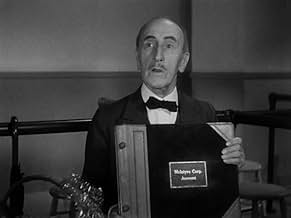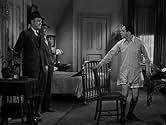NOTE IMDb
7,2/10
3,6 k
MA NOTE
Ajouter une intrigue dans votre langueA meek milquetoast clerk is mistaken for public enemy N° 1, and the notorious killer takes advantage of the situation.A meek milquetoast clerk is mistaken for public enemy N° 1, and the notorious killer takes advantage of the situation.A meek milquetoast clerk is mistaken for public enemy N° 1, and the notorious killer takes advantage of the situation.
- Réalisation
- Scénario
- Casting principal
Harry Abrahams
- Convict
- (non crédité)
Ernie Adams
- Reporter
- (non crédité)
Carmen Andre
- Clerk
- (non crédité)
Chester A. Bachman
- Policeman
- (non crédité)
Eddie Baker
- Policeman
- (non crédité)
Lucille Ball
- Bank Employee
- (non crédité)
H. Barnum
- Undetermined Secondary Role
- (non crédité)
George Barton
- Policeman
- (non crédité)
Avis à la une
I don't think there's anyone who's ever seen The Whole Town's Talking and doesn't believe this was a film intended for Frank Capra. The mere fact that the screenplay was co-written by Robert Riskin who won an Oscar together with Capra for It Happened One Night the year before should give ample indication. If Capra had a choice between this and Broadway Bill he chose wrong.
Although this kind of comedy is not usually what is found in John Ford films, Ford does OK by it. I don't think he ever directed again anything that could be remotely classified as screwball comedy.
Edward G. Robinson who would make his second and last appearance in a Ford film 34 years later in Cheyenne Autumn, plays a dual role. He plays Killer Mannion in the tradition he established as Little Caesar and also A.L. Jones a meek, mild mannered clerk a type Robinson would play later in Mr. Winkle Goes to War.
Mannion's escaped from prison and there's a manhunt on for him, similar to the kind that was on for John Dillinger a year earlier. The police will simply shoot to kill. Bad luck for a guy that looks like Mannion and worse luck when Mannion finds out about his doppleganger and tries to make use of him.
Robinson is fine in his dual performance, but the film was a milestone for Jean Arthur who plays Robinson's fellow employee and despite his being a milquetoast, she sees something in him. Up to this point Arthur had played a lot of ingénues and loyal wives to leading men. This is her first role in a screwball type comedy that she became known for, in fact what she's remembered for mostly. Of course a year later, Harry Cohn did team her with Frank Capra and they certainly made some cinematic history.
My favorite two supporting parts are Etienne Girardot as Robinson's officious little office manager and Donald Meek another milquetoast who originally mistakenly turns in the clerk as the gangster and stays on the 'case.'
Though he's not in his element John Ford serves a nice piece of entertainment.
Although this kind of comedy is not usually what is found in John Ford films, Ford does OK by it. I don't think he ever directed again anything that could be remotely classified as screwball comedy.
Edward G. Robinson who would make his second and last appearance in a Ford film 34 years later in Cheyenne Autumn, plays a dual role. He plays Killer Mannion in the tradition he established as Little Caesar and also A.L. Jones a meek, mild mannered clerk a type Robinson would play later in Mr. Winkle Goes to War.
Mannion's escaped from prison and there's a manhunt on for him, similar to the kind that was on for John Dillinger a year earlier. The police will simply shoot to kill. Bad luck for a guy that looks like Mannion and worse luck when Mannion finds out about his doppleganger and tries to make use of him.
Robinson is fine in his dual performance, but the film was a milestone for Jean Arthur who plays Robinson's fellow employee and despite his being a milquetoast, she sees something in him. Up to this point Arthur had played a lot of ingénues and loyal wives to leading men. This is her first role in a screwball type comedy that she became known for, in fact what she's remembered for mostly. Of course a year later, Harry Cohn did team her with Frank Capra and they certainly made some cinematic history.
My favorite two supporting parts are Etienne Girardot as Robinson's officious little office manager and Donald Meek another milquetoast who originally mistakenly turns in the clerk as the gangster and stays on the 'case.'
Though he's not in his element John Ford serves a nice piece of entertainment.
I saw this movie a long time ago as a teenager during a Edward G. Robinson retrospective. It was the one that stuck in my mind, and I never forgot it. Now I have it on videotape and watch it regularly, it stands multiple viewing very well.
The Whole Town's Talking is one of those perfect little movies. Everything falls into place the acting, the pace, the timing of the jokes, the dialog. Even the set design is fabulous, it was basically the big, bright office space in which the good guy Robinson plays slaves" that was unforgettable to me. The movie boasts an assortment of caricature like characters like no other movie I know, beside Robinson I would like to mention Jean Arthur, of course, and the two funny little guys, Donald Meek and, even more memorable, Etienne Girardot as the pedantic office overseer who urges Robinson to get on with the Macintyre account.
In its social comment The Whole Town's Talking reminds me of the work of Preston Sturgess. Mentionable are the media hype about a famous gangster which is really over the top (it's up there with His Girl Friday in this aspect) and the incompetence of the police force which is unable to deal with the gangster and even less with the media and is presented as a helpless and clueless organization. So the movie still has some actuality.
Movie buffs who look at John Ford as an auteur" may be disappointed. The Whole Town's Talking is very much a product of the studio system. But it amply shows what great things that system was able to accomplish at times!
The Whole Town's Talking is one of those perfect little movies. Everything falls into place the acting, the pace, the timing of the jokes, the dialog. Even the set design is fabulous, it was basically the big, bright office space in which the good guy Robinson plays slaves" that was unforgettable to me. The movie boasts an assortment of caricature like characters like no other movie I know, beside Robinson I would like to mention Jean Arthur, of course, and the two funny little guys, Donald Meek and, even more memorable, Etienne Girardot as the pedantic office overseer who urges Robinson to get on with the Macintyre account.
In its social comment The Whole Town's Talking reminds me of the work of Preston Sturgess. Mentionable are the media hype about a famous gangster which is really over the top (it's up there with His Girl Friday in this aspect) and the incompetence of the police force which is unable to deal with the gangster and even less with the media and is presented as a helpless and clueless organization. So the movie still has some actuality.
Movie buffs who look at John Ford as an auteur" may be disappointed. The Whole Town's Talking is very much a product of the studio system. But it amply shows what great things that system was able to accomplish at times!
Edward G. Robinson stars in "The Whole Town's Talking" along with Jean Arthur, Wallace Ford, and Donald Meek.
Edward G. Robinson was such a wonderful actor, a little guy with a towering talent. Here he has a dual role - that of an escaped criminal, Mad Dog Mannion and that of Arthur Jones, clerical worker, a shy man with a crush on a coworker (Arthur). When Mannion escapes from prison, his face is on the front page, and he looks so much like Jones that someone who sees him in a restaurant turns him into the police. When fingerprint ID verifies that he is not Mannion, he's given a letter by the police chief stating that he's not Mannion and should be left alone and even gets a job writing for the local newspaper about his experiences being mistaken for Mannion.
Unfortunately for poor Arthur, Mannion shows up and wants to use the pass, which he does, raising complete havoc. He also starts giving Arthur info for the news stories - and the police wonder how it is Arthur knows so much.
One of the funniest parts of the film for me was the newspaper description of Mannion - a cruel mouth, a Neandrathal face, etc., and poor Jones looking at himself in the restaurant mirror trying to look evil.
Robinson is fabulous - so sweet, so gentle, such a hard worker as Arthur and a ruthless killer as Mannion. Jean Arthur, as the outspoken Miss Clark is great - when she's questioned by the police, they assume she's Mannion's accomplice, so they keep asking her questions - who did this, who robbed that, and she keeps saying, using a tough, gun moll voice, "MANNION!" Then they find out it's not Mannion they caught after all.
I thought the movie went on just a tad too long, but otherwise, it was quite good, with fun performances, well directed by a man known for his westerns and bigger films, John Ford.
Edward G. Robinson was such a wonderful actor, a little guy with a towering talent. Here he has a dual role - that of an escaped criminal, Mad Dog Mannion and that of Arthur Jones, clerical worker, a shy man with a crush on a coworker (Arthur). When Mannion escapes from prison, his face is on the front page, and he looks so much like Jones that someone who sees him in a restaurant turns him into the police. When fingerprint ID verifies that he is not Mannion, he's given a letter by the police chief stating that he's not Mannion and should be left alone and even gets a job writing for the local newspaper about his experiences being mistaken for Mannion.
Unfortunately for poor Arthur, Mannion shows up and wants to use the pass, which he does, raising complete havoc. He also starts giving Arthur info for the news stories - and the police wonder how it is Arthur knows so much.
One of the funniest parts of the film for me was the newspaper description of Mannion - a cruel mouth, a Neandrathal face, etc., and poor Jones looking at himself in the restaurant mirror trying to look evil.
Robinson is fabulous - so sweet, so gentle, such a hard worker as Arthur and a ruthless killer as Mannion. Jean Arthur, as the outspoken Miss Clark is great - when she's questioned by the police, they assume she's Mannion's accomplice, so they keep asking her questions - who did this, who robbed that, and she keeps saying, using a tough, gun moll voice, "MANNION!" Then they find out it's not Mannion they caught after all.
I thought the movie went on just a tad too long, but otherwise, it was quite good, with fun performances, well directed by a man known for his westerns and bigger films, John Ford.
This is an atypical and impersonal Ford film. Given the studio (Columbia Pictures) and the screenwriter (Robert Riskin), this is an ideal stuff for Frank Capra. But it remains without a doubt one of the most enjoyable and pleasurable comedies ever made. It features graceful dynamism and vibrancy that are rare in the Ford oeuvre. It is also one of his fastest movies. It contains what it is probably one of the finest Edward G. Robinson performances I have seen. He is outstanding in the dual role of a mild, working class office clerk Arthur Ferguson Jones who is mistaken for a ruthless mobster Mannion (the role he perfected in "Little Caesar"). And then there is the lovely Jean Arthur as Robinson's coolly self-reliant co-worker, who starts by pitying him and then encourages him, and ultimately falls in love with him. She and Robinson are superb together. It is nowhere near her splendid presence in Mitchell Leisen's "Easy Living" and Frank Borzage's "History Is Made at Night", but this was the sort of role Arthur was to make of her own.
A must-see!
A must-see!
Enjoyed this 1935 Classic in which Edward G. Robinson plays a duel role as Arthur Ferguson, (Jonesy) and Killer Mannion. Arthur Ferguson is an ordinary law abiding citizen and is rather a very meek person. Unfortunately, Ferguson looks just like a gangster named Killer Mannion who is a harden criminal and they both seem to have the same facial appearance. Jean Arthur, (Wilhelmina Clark) gives a great supporting role along with a great cast of veteran actors. There is a split screen between Arthur Ferguson and Killer Mannion and Edward G. Robinson gives an outstanding performance in 1935 which was not seen very often in films during those days. Killer Mannion tries to murder Ferguson in a bank hold up but things get out of hand. There is plenty of drama and comedy. This is truly a great Classic Film. Enjoy
Le saviez-vous
- AnecdotesThe $250.00 per week that Jones is to get for writing the article in this 1935 comedy translates to $4,999.23 per week in 2019 dollars.
- GaffesWhen Jonesy leaves his apartment in a rush he forgets to turn off the taps and his tub is (torrentially) overflowing. But when he returns from the police much later in the day there is no water anywhere.
- Citations
Arthur Ferguson Jones: You know something, a woman is only a woman, but a good cigar is a smoke.
- ConnexionsEdited into Michael Jackson's This Is It (2009)
Meilleurs choix
Connectez-vous pour évaluer et suivre la liste de favoris afin de recevoir des recommandations personnalisées
- How long is The Whole Town's Talking?Alimenté par Alexa
Détails
- Durée1 heure 33 minutes
- Couleur
- Rapport de forme
- 1.37 : 1
Contribuer à cette page
Suggérer une modification ou ajouter du contenu manquant

Lacune principale
By what name was Toute la ville en parle (1935) officially released in India in English?
Répondre

